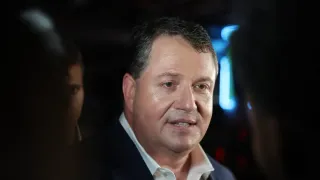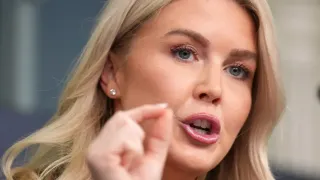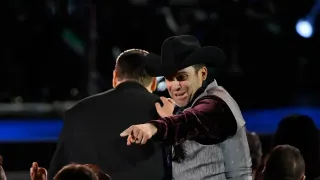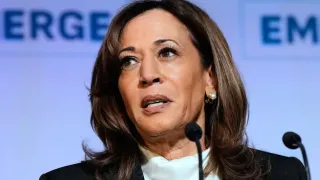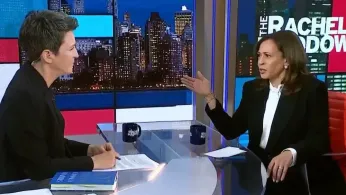
3 hours ago
Rachel Maddow Challenges Kamala Harris Over Buttigieg Comments in Candid MSNBC Interview
READ TIME: 4 MIN.
On Monday evening, MSNBC host Rachel Maddow conducted a live interview with former Vice President Kamala Harris, which quickly became a focal point for national debate regarding LGBTQ+ representation in politics. The discussion centered on Harris’s decision not to select former Transportation Secretary Pete Buttigieg as her vice presidential running mate during the tumultuous 2024 election, a choice she elaborated on in her recently published memoir, "107 Days" .
Harris, who became the first woman of Black and South Asian descent elected to the vice presidency, described Buttigieg as her "ideal partner — if I were a straight White man." She explained that the decision was not rooted in personal prejudice, but in a calculated assessment of the political climate and perceived risks associated with a ticket comprising both a Black woman and a gay man, especially against a formidable opponent like Donald Trump .
During the interview, Maddow, herself a prominent lesbian journalist, directly addressed the passage in Harris’s memoir. "To say that he couldn't be on the ticket effectively because he was gay, it’s hard to hear," Maddow said, reflecting the sentiments of many in the LGBTQ+ community who saw Buttigieg’s potential nomination as a historic step forward .
Harris responded, "That's not what I said, that he couldn't be on the ticket because he is gay." She elaborated, "My point is, as I write in the book, I was clear that in 107 days, in one of the most hotly contested elections... to be a Black woman running for President of the United States, and as a vice presidential running mate, a gay man. With the stakes being so high, it made me very sad. But I also realized it would be a real risk" .
Harris emphasized that her choice was not a reflection of any lack of support for the LGBTQ+ community, stating, "I have been an ally my whole life. It was not due to any prejudice on my part. We had such a short period of time. And the stakes were so high. I think Pete is a phenomenal, phenomenal public servant" .
The exchange highlighted the complexities of balancing political viability with social progress. Buttigieg, who was surprised by the book’s passage, commented to Politico that he believes in "giving Americans more credit" regarding their readiness for diverse leadership .
Maddow’s line of questioning resonated with many LGBTQ+ advocates, who have long pushed for increased visibility and representation in national politics. The notion that a candidate’s sexual orientation could be viewed as an electoral liability sparked renewed calls for confronting homophobia and racism in American political discourse .
Several LGBTQ+ organizations weighed in following the interview. The Human Rights Campaign released a statement calling for political leaders to "challenge the false notion that LGBTQ+ identities are a political risk, rather than a source of strength and diversity" .
The Maddow-Harris interview comes at a time when the visibility of LGBTQ+ leaders is at an all-time high, but so too are concerns about backlash and the persistence of identity-based barriers. Harris’s candid reflections, while controversial to some, underscore the ongoing tension between strategic political decision-making and the imperative for authentic representation.
Harris ultimately chose Minnesota Governor Tim Walz as her running mate, a decision that brought its own challenges. Walz faced negative headlines over misleading statements about his military record, further complicating Harris’s campaign .
When asked about her regrets and future plans, Harris acknowledged the weight of her choices and the sadness that accompanied them. "Maybe I was being too cautious," she admitted. "I’ll let our friends, we should all talk about that. Maybe I was, but that’s the decision I made. And I’m, as with everything else in the book, I'm being very candid about that, with a great deal of sadness about also the fact that it might have been a risk" .
The interview concluded with Harris reiterating her commitment to fighting for democracy and against the forces of bigotry and division. "America is and would be ready for that," she said, referencing the possibility of a future ticket featuring both a Black woman and a gay man. "But when I had to make that decision with two weeks to go... I had to weigh everything" .
The Maddow-Harris exchange has become a catalyst for a broader conversation about intersectionality, representation, and the challenges faced by LGBTQ+ and BIPOC leaders in the highest echelons of government. Advocates point out that each time such issues are debated publicly, it opens doors for more meaningful progress and allyship.
Many in the LGBTQ+ community hope that Harris’s candor and Maddow’s probing questions will encourage future candidates to embrace diversity not as a liability, but as a defining strength. As Buttigieg said, “I believe in giving Americans more credit.” The national dialogue sparked by this interview may be an important step toward realizing that belief .
